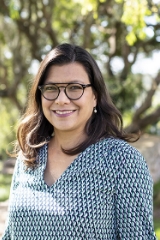Sustainability
“Indigenous knowledge can improve the future”
Indigenous peoples manage and care for over one quarter of Earth’s land surface. Sarah-Lan Mathez-Stiefel, researcher at Centre for Development and Environment (CDE) at the University of Bern, is convinced that Indigenous knowledge can help address our current planetary crises.

Sarah-Lan Mathez-Stiefel: Indigenous peoples and local communities view their environment holistically: nature – and thus biodiversity – is not seen as external to human society, but rather as an entity with which one exists in a relationship, for which one cares and nurtures.
The effect of this view becomes apparent in the more than a quarter of the world’s land surface they care for and manage: a far greater proportion of those lands are environmentally healthy landscapes than in other areas. Their knowledge can thus help us understand the environment and address our planetary crises. This is not only my opinion, it is also increasingly recognized in international forums such as UNEP’s Global Environmental Outlook 7 (GEO-7). It was even a mandate from the UN member states to incorporate Indigenous and local knowledge into this international scientific assessment. This shows that it is important to include them in these conversations.
About the person

Sarah-Lan Mathez-Stiefel
is a Senior Research Scientist at the Centre for Development and Environment (CDE) at the University of Bern. She is the President of the International Society of Ethnobiology and teh co-convenor of UNEP’s Global Environmental Outlook (GEO-7) taksforce on Indigenous Knowlege and Local Knowldge.
Indigenous and local knowledge systems can inspire innovative, alternative approaches only – and this is important – only if policymakers and powerful actors are open to learning from them. Of course, the receptiveness of decision-makers is a whole different question. But facilitating international events and scientific assessments that explicitly highlight these alternatives is an important first step towards making these other knowledges and values available. Additional political steps go beyond our purview as researchers.
Still, you try to influence the debate.Yes, in the end this reflects the mission of the International Society of Ethnobiology: to contribute to better futures in which both natural environments and the local societies that depend on them can thrive.